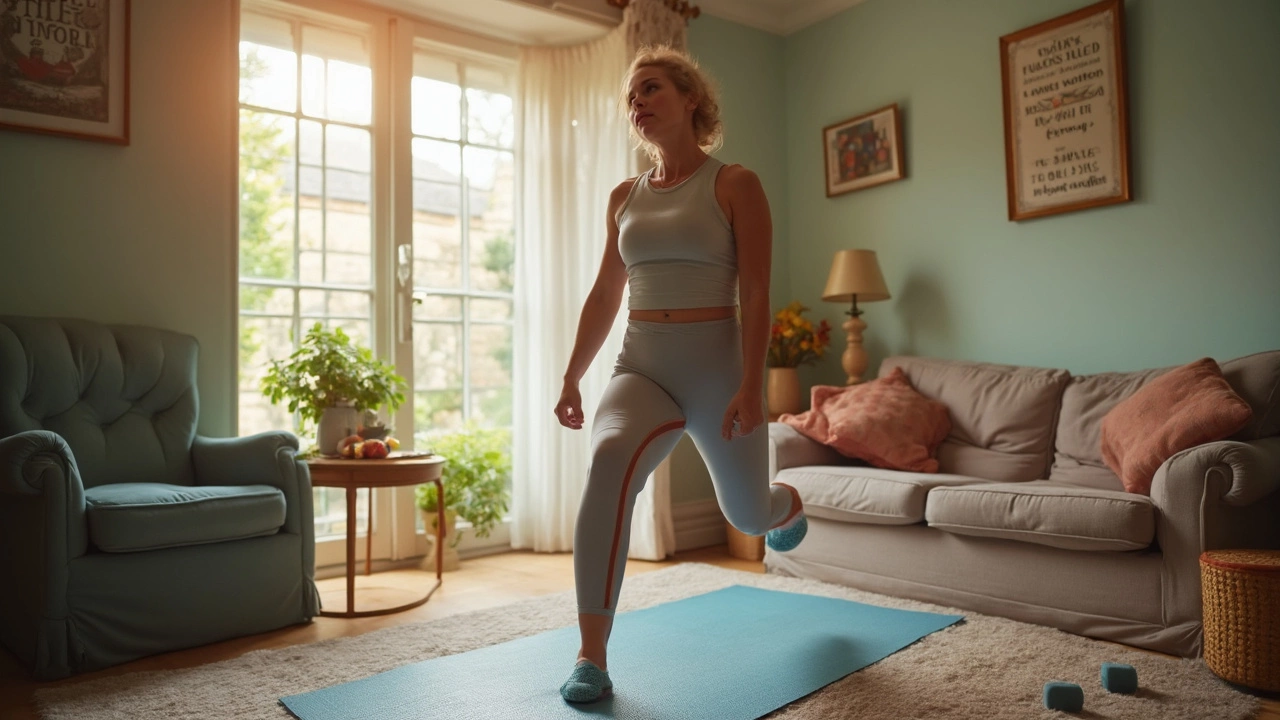How to Be Fit and Healthy
 Feb, 20 2025
Feb, 20 2025
Ever feel like fitness is this gigantic, overwhelming task looming over you? Trust me, many people do. But here's the thing—being fit and healthy isn't about spending hours in the gym or following some crazy diet plan. It's about making small, manageable changes that you can stick with.
Let's start with exercise. You might think you need fancy equipment or a lot of time, but honestly, just a brisk 30-minute walk a day can really do wonders for your health. Got stairs? Perfect! You can do some quick sets climbing up and down. The key is to keep moving, even if it's just for a short while each day.
Exercise Made Easy
Thinking exercise means sweating it out in a gym? Not really, mate. There are tons of ways to fit exercise into your life without needing a gym membership. The trick? Find activities you enjoy—that way, it doesn't feel like a chore.
Start Small with Walking
Walking is one of the simplest and most underrated forms of exercise. Just 30 minutes a day can boost your mood, improve cardiovascular health, and even help with weight management. Got a dog? Perfect walking buddy! No pet? Invite a friend or listen to a podcast while strolling.
Home Workouts
Can't make it to the gym? Bring the gym to you with home workouts. You don’t need fancy equipment. Use bodyweight exercises like push-ups, squats, and lunges. Even a little yoga can make a big difference.
- Push-Ups: Start with 5 a day and work your way up.
- Squats: Aim for 10 squats while waiting for your coffee to brew.
- Lunges: Great for leg strength; try doing lunges during TV ads.
Break a Sweat in 10 Minutes
Pressed for time? High-intensity interval training (HIIT) workouts are super effective. Just 10 minutes of HIIT can burn the same calories as a half-hour jog. Try intervals of 30 seconds jumping jacks, 30 seconds rest, repeat!
Make It a Routine
Consistency matters more than intensity. Make a schedule and stick to it. Whether it's morning stretches or a post-dinner walk, having a routine helps integrate fitness into your lifestyle.
| Activity | Calories Burned (per hour) |
|---|---|
| Walking | 200-300 |
| Bodyweight Exercises | 350-450 |
| HIIT | 500-700 |
So, next time you think of fitness, remember it's about staying active, not about killing yourself in the gym. Make it easy, make it fun, and most importantly, make it yours!
Eat Smart
Eating smart isn't about saying goodbye to your favorite foods forever. It's about making smarter choices more often. One of the simplest ways to start is by adding more whole foods to your diet like fruits, veggies, nuts, and grains, which are packed with nutrients without the added junk.
Portion Control
Ever hear about portion distortion? It's when our idea of 'normal' serving sizes keeps getting bigger! Instead of super-sizing, use smaller plates or bowls to help control how much you eat. You'll be surprised how much a simple change like this can help manage your health.
Stay Hydrated
Water is life. Really, it keeps your body happy and fueled. Aim for drinking about 8 glasses a day—or more if you work out a lot. And if water's too boring, you can jazz it up with slices of lemon or cucumber.
Limit Processed Foods
Processed foods often come packed with hidden sugars, salts, and unhealthy fats. Instead of reaching for that bag of chips, consider popping up some air-popped popcorn or munching on some carrots with hummus. They're not just healthier—they also keep you full longer.
Mindful Eating
Take a moment to really 'be' with your food. Turn off distractions, chew slowly, and really savor the flavors. This can help you notice the signals your body sends when it's full, so you don't overeat.
Watch Those Calories
Knowing roughly how many calories you consume can be a real game-changer. It's not about counting every single calorie forever but having a general idea can help keep you on track. But remember, focus on quality over quantity. Eating 200 calories of almonds is way different than eating 200 calories of candy.

Sleep Deep
Getting a good night's sleep is like hitting a reset button for your body and mind. It's crucial for staying healthy and energizing your day. But how much sleep do you really need? Adults should aim for 7 to 9 hours per night.
Why Sleep Matters
Quality sleep helps improve memory, boost mood, and even regulate weight. It's when your body repairs itself and your brain processes information. Lack of sleep can lead to stress, weakened immunity, and even weight gain.
Tips for Better Sleep
- Keep a Schedule: Try to go to bed and wake up at the same time every day, even on weekends. This helps regulate your body's clock.
- Environment: Make your bedroom a sleep haven—quiet, dark, and cool. Consider blackout curtains or a sleep mask if light's an issue.
- Limit Screens: The blue light from screens can trick your brain into thinking it's still daytime. Shut off devices an hour before bed if you can.
- Wind Down: Create a relaxing pre-sleep routine. Whether it's reading, a warm bath, or some light stretches, find what helps you feel calm.
- Avoid Caffeine: It's pretty obvious, but avoid caffeine in the afternoon and evening to prevent it from messing with your sleep cycle.
Interesting Stats
| Aspect | Hours Affected |
|---|---|
| Productivity Decrease | 6% less with less than 6 hours of sleep |
| Risk of Insomnia | Increased by 20% with poor sleeping habits |
Remember, getting enough sleep isn't a luxury—it's essential for your fitness and overall wellbeing. So, make sure you prioritize those zzz's!
Mind Matters
When we talk about being fit and healthy, we can’t overlook mental wellness. It's like the engine that keeps everything running smoothly. A healthy mind is just as important as a fit body.
Power of Positivity
A positive mindset can actually boost your health. Research has shown that optimists tend to live longer and have better heart health. Why? Because positivity reduces stress, and less stress means a happier, healthier you.
Stress Busters
Speaking of stress, it’s part of life. But managing it is key. Try techniques like meditation, yoga, or even simple breathing exercises. Here’s a quick exercise:
- Sit or lie down in a comfortable position.
- Close your eyes and take slow, deep breaths, in through your nose and out through your mouth.
- Focus on the air going in and out, and try to let go of any stressful thoughts.
The Joy of Connection
Did you know that social connections can improve your wellbeing? Hanging out with friends or family can lower stress levels and improve your mood. So, why not call a friend for a chat or plan to catch up over a coffee on the weekend?
Lastly, remember that it’s okay to ask for help. If you feel overwhelmed, don't hesitate to reach out to a professional. Taking care of your mental health is a sign of strength, not weakness.